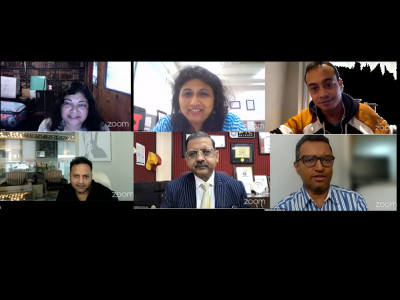It is more difficult for women to rise to CEO positions: Mrinal Jha
We, at Adgully, have always saluted and honoured women managers and leaders across diverse fields. Last year, we launched our unique and distinct program, called WOMEN DISRUPTORS, which drew a lot of attention and was highly appreciated by the industry. W-Suite is a special initiative from Adgully that has been turning the spotlight on some of the most remarkable women achievers in M&E, Advertising & Marketing, PR & Communication industry. In the refurbished series, we will find out how women leaders have been managing their teams and work as well as how they have been navigating through the toughest and most challenging times brought about by the global pandemic.
In this interaction with Adgully, Mrinal Jha, Founder, MAJ (Mrinal Abhigyan Jha) Productions, speaks about the expanding role and scope for women leaders today, more representation in the boardroom, tackling sexual harassment at the workplace and more.
How would you define today’s woman leader?
Any leader, be it a man or a woman, needs to have certain special qualities. They must obviously inspire a bunch of people. For that to happen, they must think ahead of the curve, they must have the courage to put their necks on the line, and they must be ready to bear the burden of stress as well as take responsibility for more than just themselves. Naturally, it’s tough. Traditionally it was assumed that women couldn’t take that kind of strain, they had the responsibility of home and would be ill equipped to handle outside pressures. But now we have millions of examples of women proving that notion wrong, at various levels. Women are assuming leadership positions in all fields, whilst also accomplishing pivotal roles within the family. Maybe the famed multi-tasking ability of the woman is the secret recipe here.
Despite the qualifications, aptitude and experience, why do you think we don’t see the expected number of women business leaders, especially when it comes to boardroom decision-making?
Any foundational change requires time. In the US for example, women got the right to vote as late as in the 1920’s. Today, they occupy about 25% of the top senior level positions in the country. Of course, at the CEO level, it is only 6% of women as yet. In India, it is gauged that about 17% of board positions are held by women. Not a huge number, but from zero to this number is surely an upward trend. Apparently India fares better than the rest of Asia in this regard. So, it may seem like slow progress, but I am glad it’s a move in the right direction. I am certain it’s only going to get better and that the gap is going to close in. To my mind it is definitely sooner than most think.
According to you, what are the do’s and don’ts for today’s women to break through the glass ceiling?
Definitely you must believe in yourself, your own abilities and in the possibility of making it to the top. But to my mind – and it may not be a popular view – it is more important to see oneself as an individual before one sees oneself as a man or a woman. A leader is gender neutral.
How acute is the gender pay gap issue in India today? What needs to be done to address this in an effective manner?
I think this issue is more marked in the West. In India, and especially in my industry, there is no gap. Women are paid as well as men and rewarded equally for their work. But I do agree it is more difficult for women to rise to CEO positions and that’s one barrier that still remains to be broken. And I think the best way to break this chain is to have more women found their own companies. In media, we have many examples of this, women who are doing extremely well for themselves and have their own companies.
What are the five most effective lessons that you have learned as a woman leader?
This is more than 5, but here goes –
- Focus on the goal
- Ignore the chatter (particularly from men…haha)
- Keep learning, keep bettering yourself as a human being
- Have a sense of humour
- Do not take yourself too seriously or too lightly either
- Find yourself
How prevalent are the instances of Sexual Harassment in workplaces in India? What should the industry collectively do to tackle such a serious issue?
I think making sexual harassment out to be as an unsolvable problem undermines women at the workplace and in a way portrays as if women do not possess the power and agency to deal with life situations. But having said that, I have always found women are more than able to deal with situations that arise at the workplace. Let’s not paint women as if we are damsels in distress. That is more patriarchal than anything else.


















Share
Facebook
YouTube
Tweet
Twitter
LinkedIn